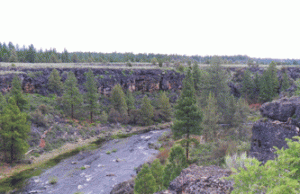But as her friends bought adjoining and nearby properties, the number of acres swelled to 190. And when the group of landowners and friends wanted to restore previously logged forestlands and their combined three-quarter's of a mile of river frontage, McMahon investigated ways to obtain grants to accomplish those goals.
The result is the Klamath Lake Land Trust, a nonprofit organization created earlier this year with McMahon as its executive director.
"We're still pretty new," she said of the fledging group, which is in the process of protecting more than 2,500 acres of Klamath County lands.
"We'd like to be seeing the protection of restored riparian areas and the recovery of endangered fish," McMahon said. "We want to see the continued aesthetic beauty of the Klamath Basin and even stronger tourism based on natural resources."
Focus on rivers
Because the group is new, the current focus is on the Sprague and Williamson rivers, although it is involved in other Klamath County projects and eventually hopes to include Lake County.
McMahon said the land trust is new to Klamath and Lake counties, but not to Oregon or the U.S. Land trusts have existed in the Eastern U.S. for 150 years, while the Southern Oregon Land Conservancy has 30-plus years of experience west of the Cascades.
The goals for all land trusts, according to McMahon, include restoring and protecting forests, wetlands, deserts and watersheds by working with government agencies and landowners.
In many cases, landowners work with the land trust to develop conservation easements establishing legal protection for areas landowners want protected for future generations.
Increasing footprint
The trust also considers buying or accepting land donations of exceptional value, and offers assistance on forest and streambased restoration.
"It has to be exceptional, not just anything that's out there. Something that's really worth that level of protection," McMahon said.
Funding comes from a mix of sources, including the U.S. Fish and Wildlife Service. Oregon Wild and the Land Trust Alliance. More than 130 people also attended a recent fundraising banquet.
"We are investing in our future with land trusts that ensure clean water, local food and places for our children and for generations to come," McMahon said.

